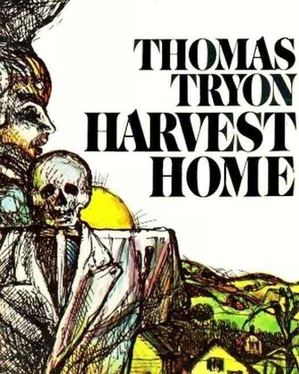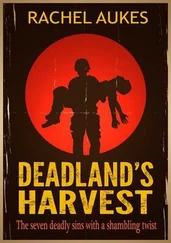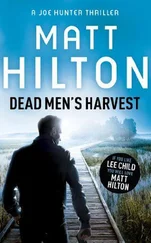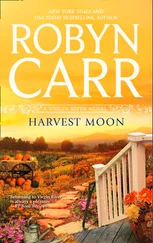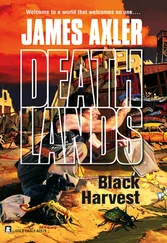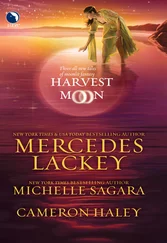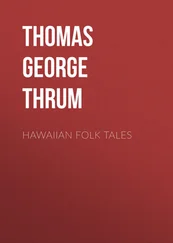Thomas Tryon - Harvest Home
Здесь есть возможность читать онлайн «Thomas Tryon - Harvest Home» весь текст электронной книги совершенно бесплатно (целиком полную версию без сокращений). В некоторых случаях можно слушать аудио, скачать через торрент в формате fb2 и присутствует краткое содержание. Жанр: Ужасы и Мистика, на английском языке. Описание произведения, (предисловие) а так же отзывы посетителей доступны на портале библиотеки ЛибКат.
- Название:Harvest Home
- Автор:
- Жанр:
- Год:неизвестен
- ISBN:нет данных
- Рейтинг книги:5 / 5. Голосов: 1
-
Избранное:Добавить в избранное
- Отзывы:
-
Ваша оценка:
- 100
- 1
- 2
- 3
- 4
- 5
Harvest Home: краткое содержание, описание и аннотация
Предлагаем к чтению аннотацию, описание, краткое содержание или предисловие (зависит от того, что написал сам автор книги «Harvest Home»). Если вы не нашли необходимую информацию о книге — напишите в комментариях, мы постараемся отыскать её.
For Ned and his family, Cornwall Coombe was to be come a place of ultimate horror.
Harvest Home — читать онлайн бесплатно полную книгу (весь текст) целиком
Ниже представлен текст книги, разбитый по страницам. Система сохранения места последней прочитанной страницы, позволяет с удобством читать онлайн бесплатно книгу «Harvest Home», без необходимости каждый раз заново искать на чём Вы остановились. Поставьте закладку, и сможете в любой момент перейти на страницу, на которой закончили чтение.
Интервал:
Закладка:
The talk got around to gardening, and I informed the table of my intention to plow up the meadow next spring and plant vegetables. Worthy instantly became excited, and said he would bring his tractor around. We got into a discussion of organic gardening, and he described the kind of operation some friends of his had over in the neighboring town of Danforth. Like ourselves, they, too, had come from the city, and had pooled all their money and resources to form a commune. They had bought a defunct place which they rechristened Nonesuch Farm, and though the townsfolk called them hippies and weren’t being helpful, they hoped in two years’ time to put it on a paying basis.
“I’m going over there this afternoon, if you’d like to see it.”
Another time, I suggested; I had plans for Beth and myself. But perhaps Kate might enjoy the ride. I signaled Beth, who had opened her mouth to protest; she quickly picked up the cue and consented.
“Back to school soon?” I asked him.
“Yes, sir.”
“Are you looking forward to that?” Beth said.
“Yes, ma’am.” He was in his last year of high school, and, as he had told me, hoped, against his father’s wishes, to enter agricultural school next fall. He had been working hard to earn the money, and had been studying nights, “when Pa doesn’t catch me.” As the conversation continued, I watched him closely. His moodiness, habitual of late, seemed to have washed off at the kitchen sink, and he laughed and joked with Kate, who, seated across from him, kept plying him with various dishes. Perhaps the Widow was right, perhaps he just needed more feeding.
I asked him what the latest village news was. Not much, he replied; never any news in Cornwall Coombe. Mrs. Mayberry was ailing, wouldn’t last till Harvest Home; Mrs. Thomas was going to have a baby, probably before next Tithing Day; Elsie Penrose, the librarian’s daughter, was going to be courted by Corny Penrose, her second cousin on her father’s side. Corny had given Elsie a cob.
“Mrs. Thomas is going to have a baby? How wonderful!” Beth exclaimed. “Why is Elsie getting a cob from Corny Penrose?”
Worthy said it was an old village custom; when a boy was interested in a girl he sent her a corn ear, and if she accepted his attentions she husked the ear and returned it; if she wasn’t interested she sent it back unshucked. Sometimes a girl, if she was bold enough, would send an ear to a boy. But whatever ears might be sent, the results had to wait until the crops were in.
“Has anybody sent you a cob?” Kate asked.
“Not yet.”
She looked relieved and began relating what she had learned from the Widow’s quilt concerning the Corn Play. Worthy’s face darkened. “That’s silly stuff.”
By diligent questioning, Kate found out a little more about the choosing of the Harvest Lord and the Corn Maiden. Since the original Agnes Fair, the Harvest Lord had always been picked on that day. He would be crowned with honors the following year at Spring Festival, when the villagers would bring him presents. Then, during the next seven years, he would be given all sorts of privileges, including free communal labor to work his fields and farm. And at some point during that time, he would select a Corn Maiden to reign with him.
“Is it always a husband, who chooses his wife?” Beth asked.
No. The village had been surprised when Justin had married Sophie, then picked her for his Corn Maiden. Usually it was a single girl. When the Corn Play was given, in the Grange hall, the new Corn Maiden would be crowned.
Beth and Kate cleared the table and brought in dessert and coffee. When they were seated again, Kate asked, “Worthy, you’re going to be the new Harvest Lord in the play, aren’t you? Who’ll you pick for Corn Maiden?”
I exchanged a look with Beth: bold as brass, our daughter. Worthy frowned and didn’t answer; he wasn’t interested in all that.
“Do they have square-dancing at the husking bee?”
“Sure.”
“Can you square-dance?”
“Sure.” But he didn’t like doing it. Square-dancing was old-fashioned, for old fogeys who lived in the past. He didn’t want to live in the past; he wanted to live in the here and now. His brows were drawn down in a gloomy line as he toyed with his napkin. “Mr. Deming carrying on like that at the fair. All I was doing was having some fun, but you’re not supposed to bring a tractor on the Common. You’re not supposed to play on the shinny pole. Old geezers like him don’t think anything’s funny. The minute you do different or act different, people talk. It makes you stand out, and people around here don’t want to stand out.”
“Do you?”
“Well, I don’t want to be like everyone else. There’s no point in doing things just because other people do them, is there? I think it’s crazy doing them their way just because it’s their way. Look at Gracie Everdeen.”
“What about Gracie Everdeen?” I put down my fork and prepared to listen.
“I don’t know, really. It all happened when I was small. But there’s been lots of talk.”
“What kind of talk?”
“They say she went crazy.”
Gracie Everdeen, a product of the overly mixed bloodlines of the village? “Was she a Penrose?”
“I don’t know, sir. She may have been. Almost everybody is, one way or another. She was supposed to marry a Penrose.”
“She was?”
“They were engaged, then she ran off.”
“But she came back, didn’t she? She’s buried in the cemetery-or out of it, rather. Why is that?”
“I don’t know, sir.”
“Who was she engaged to?”
“Roger Penrose.”
Ah, Roger Penrose the bone-carver. “Did he marry someone else?”
“He died.”
“How?”
“He got killed jumping his horse. A broken neck, I think. Like I say, it all happened a long time ago. Before-”
“Yes?”
He shrugged. “Before I was old enough to remember.” He glanced at the clock on the wall. “Gee-it’s getting late-”
“Don’t you want dessert?” Beth said.
“Maybe we’d better get started,” he suggested quickly and I had an idea he was trying to extricate himself from a conversation he was sorry he’d begun in the first place.
When we had seen them off for Danforth, with instructions to be back before nine, Beth and I put the dinner dishes in the dishwasher, then walked down the lane and through the meadow to the river, where we found the boat Amys had mentioned. We had brought along a blanket and a transistor radio, and Beth tuned in some music, sitting in the stern, while I turned the boat and began rowing upriver.
It was one of those days a happy man records for his mental posterity. Sunday afternoon, New England, summer’s end. A dreaming landscape; faultless sky; dazzling clouds; bursting sunlight; river calm, placid, seductive in its peaceful turnings; the splash of water, creak of oarlocks. Birds singing along the shore; the play of light and shadow among the trees; a little music; your wife, whom you love. What might be called the ingredients for a perfect day.
I could tell Beth was in one of her reflective moods and I did not try to make conversation, but only gave myself up to the beauty of the afternoon. Along the shore, the oncoming autumn was showing itself, not outright, but secretly, in the smallest corners. There was a tang of smoke in the air, making a kind of uneven haze that seemed to lay a golden sheen over everything-water, trees, foliage-with the soft luminosity of a Turner painting. It was a special kind of ease and contentment that enveloped me as we followed the meandering course of the river for perhaps a mile, until we came within sight of Soakes’s Lonesome. When we had got around several more bends, I saw on the opposite bank the Soakeses’ jetty. Half a dozen ducks floated idly in the water, while on the landing the old man and the boys were hunched over some kind of activity. They looked up, eying us briefly as we passed. I got a feeling of menace from this furtive appraisal, and as I glanced back the old man opened his knife and stropped the blade on his boot. Putting more force into my strokes until we were well past them, I looked back again to see one of them getting into the skiff.
Читать дальшеИнтервал:
Закладка:
Похожие книги на «Harvest Home»
Представляем Вашему вниманию похожие книги на «Harvest Home» списком для выбора. Мы отобрали схожую по названию и смыслу литературу в надежде предоставить читателям больше вариантов отыскать новые, интересные, ещё непрочитанные произведения.
Обсуждение, отзывы о книге «Harvest Home» и просто собственные мнения читателей. Оставьте ваши комментарии, напишите, что Вы думаете о произведении, его смысле или главных героях. Укажите что конкретно понравилось, а что нет, и почему Вы так считаете.
